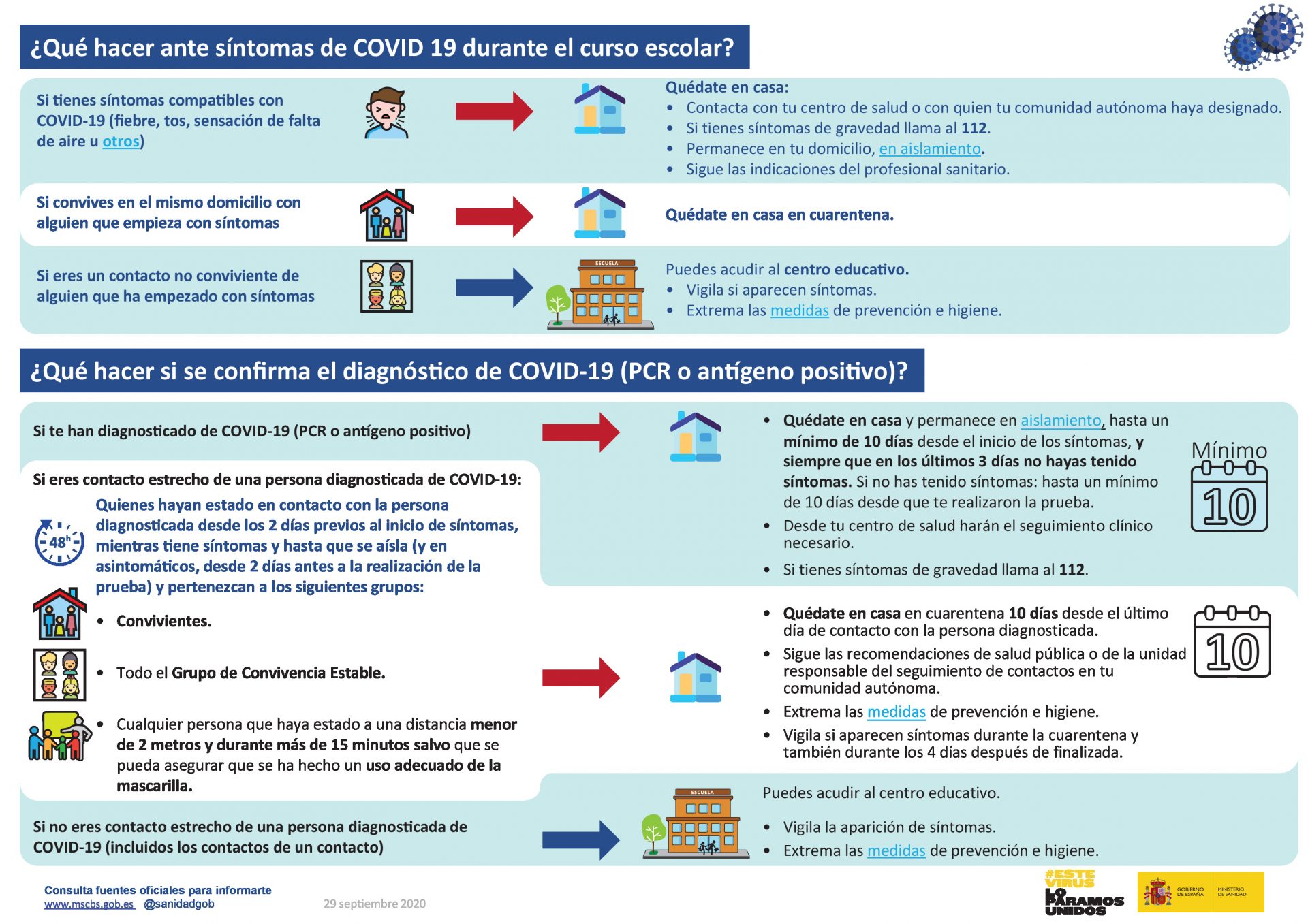What to do if the diagnosis of COVID-19 is confirmed (PCR or positive antigen)?
If you have symptoms consistent with COVID-19 (fever, cough, feeling of lack air or others):
Stay at home.
• Contact your health center or whoever your autonomous community has designated.
• If you have serious symptoms, call 112.
• Stay at home, in isolation.
• Follow the instructions of the healthcare professional.
If you live at the same address with someone starting with symptoms:
Stay home in quarantine.
If you are a non-living contact of someone who has started with symptoms:
You can go to the educational center.
• Watch for symptoms.
• Extreme prevention and hygiene measures
What to do if the diagnosis of COVID-19 (PCR or positive antigen) is confirmed?
If you have been diagnosed with COVID-19 (PCR or positive antigen):
• Stay home and remain in isolation, up to a minimum of 10 days from the onset of symptoms, and provided that in the last 3 days you have not had symptoms.
If you have not had symptoms: to a minimum 10 days after the test was performed.
• From your health center they will do the clinical follow-up necessary.
• If you have serious symptoms, call 112.
If you are in close contact with a person diagnosed with COVID-19,
who have been in contact with the person diagnosed 2 days before the onset of symptoms, while you have symptoms and until you isolate yourself (and in asymptomatic, from 2 days before the performance of the test) and belong to the following groups:
• Inmates.
• The entire Stable Coexistence Group.
• Anyone who has been at a closer distance of 2 meters and for more than 15 minutes unless can ensure that proper use has been made of the mask.
Stay home in quarantine 10 days from the last day of contact with the person diagnosed.
Follow public health or unit recommendations responsible for tracking contacts in your autonomous community.
Extreme prevention and hygiene measures. • Watch for symptoms during quarantine and also during the 4 days after completion.
If you are not close contact with a person diagnosed with COVID-19 (including the contacts of a contact):
You can go to the educational center.
• Watch for symptoms.
• Extreme prevention and hygiene measures.
Consult official sources to find more information.
Was zu tun, wenn die Diagnose von COVID-19 bestätigt ist (PCR oder positives Antigen)?
Wenn Sie Symptome haben, die mit COVID-19 vereinbar sind (Fieber, Husten, Luftmangel oder andere):
Bleib zu Hause.
• Wenden Sie sich an Ihr Gesundheitszentrum oder an jemanden, den Ihre autonome Gemeinschaft benannt hat.
• Wenn Sie schwerwiegende Symptome haben, rufen Sie 112 an.
• Bleiben Sie isoliert zu Hause.
• Befolgen Sie die Anweisungen des medizinischen Fachpersonals.
Wenn Sie mit jemandem an derselben Adresse wohnen, der mit Symptomen beginnt:
Bleib zu Hause in Quarantäne.
Wenn Sie nicht ein einwohnendes Kontakt von jemandem sind, der mit Symptomen angefangen hat:
Sie können zum Bildungszentrum gehen.
• Achten Sie auf Symptome.
• Extreme Präventions- und Hygienemaßnahmen
Was zu tun, wenn die Diagnose von COVID-19 (PCR oder positives Antigen) bestätigt wird?
Wenn bei Ihnen COVID-19 diagnostiziert wurde (PCR oder positives Antigen):
• Bleiben Sie zu Hause und bleiben Sie isoliert, bis zu a mindestens 10 Tage nach Auftreten der Symptome und vorausgesetzt, Sie haben in den letzten 3 Tagen nicht gehabt Symptome. Wenn Sie keine Symptome hatten: auf ein Minimum 10 Tage nach Durchführung des Tests.
- Von Ihrem Gesundheitszentrum aus werden sie die klinische Nachsorge durchführen notwendig.
- Wenn Sie schwerwiegende Symptome haben, rufen Sie 112 an.
Wenn Sie in engem Kontakt mit einer Person stehen, bei der COVID-19 diagnostiziert wurde:
Wer war in Kontakt mit der Person diagnostiziert 2 Tage vor dem Einsetzen der Symptome, während Sie Symptome haben und bis Sie sich isolieren (und in asymptomatisch, ab 2 Tagen vor der Durchführung der test) und gehören zu folgenden Gruppen.
• Mitbewohnern.
• Die gesamte stabile Koexistenzgruppe.
• Jeder, der näher dran war von 2 Metern und für mehr als 15 Minuten, es sei denn kann sicherstellen, dass die ordnungsgemäße Verwendung der Maske.
Bleiben Sie 10 Tage nach dem letzten Kontakttag mit der diagnostizierten Person in Quarantäne.
Befolgen Sie die Empfehlungen der öffentlichen Gesundheit oder der Abteilung, die für die Verfolgung von Kontakten in Ihrer autonomen Gemeinschaft verantwortlich sind.
Extreme Präventions- und Hygienemaßnahmen. • Achten Sie während der Quarantäne und auch während der 4 Tage nach Abschluss auf Symptome.
Wenn Sie keinen engen Kontakt zu einer mit COVID-19 diagnostizierten Person haben (einschließlich der Kontakte eines Kontakts):
Sie können zum Bildungszentrum gehen.
• Achten Sie auf Symptome.
• Extreme Präventions- und Hygienemaßnahmen.


